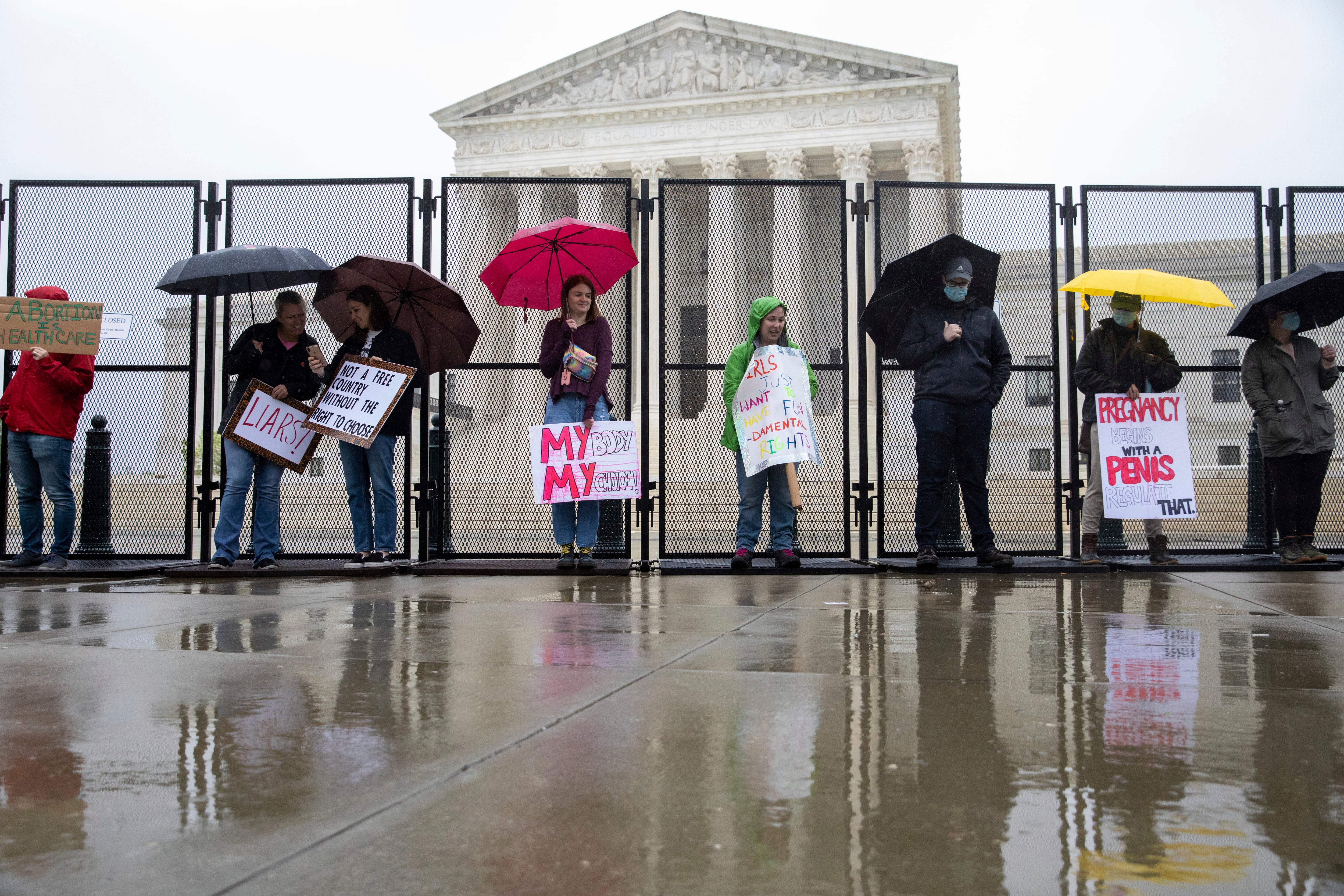A month after the Supreme Court overturned the federal right to abortion access, the Defense Department and service members are still trying to pin down what it means for troops and their families.
DoD is working with its lawyers and Congress to figure out whether legislation or policy could reasonably bridge the gaps in safe, legal abortion access for hundreds of thousands of service members and their families, as states rolling back abortion access creates an extra layer of complication for a community that already has limited access to abortion.
During a Friday hearing on the issue by a House Armed Services subcommittee, an Air Force officer shared the story of her abortion years ago, when preparing to commission.
Based in Alabama at the time, Maj. Sharon Arana told lawmakers, she decided to travel to Atlanta, the closest option, on a weekend. But the state required her to submit to a transvaginal ultrasound and then wait three days to return to the clinic for the procedure, time she didn’t have because she had to be back in Alabama for training on Monday.
Instead, she waited another week and got the abortion while she was back home in New York during a planned post-graduation vacation.
“I know that if I didn’t have an abortion, I would not have been able to continue my training as a single mother and brand new lieutenant ... I also know that it didn’t have to be that difficult,” said Arana, who went on to marry her partner and have two more children with him. “I was fortunate enough to come from a state that honors a woman’s right to make her own decisions. And I wasn’t forced to carry through with a pregnancy against my will.”
Today, Georgia is moving to ban abortions after six weeks ― a period when many women don’t know they’re pregnant yet ― and service members in Arana’s situation would have to travel even farther.
RELATED

With the Dobbs v. Jackson Women’s Health Organization ruling, military health insurance beneficiaries now have even fewer options in many states, with a majority expected to restrict abortions to, at most, just in cases of rape, incest and risk to the life of the mother.
Only those types of procedures can be done at military treatment facilities, or can be paid for by Tricare, because of the Hyde Amendment ― a ban on using federal funds to pay for abortions outside of those circumstances.
But it’s not straightforward at all.
Dr. Ghazaleh Moayedi, a civilian obstetrician-gynecologist, told lawmakers, “Once at Fort Bliss I realized the problem to actually access abortion care on base: everything must line up perfectly for the survivor. I was only able to care for one such person at Fort Bliss.”
That patient was a rape survivor who had become pregnant, so her abortion was covered by Tricare, and Moayedi was able to do the procedure in-house.
There are hundreds of military installations both in the U.S. and abroad. Not all of them have providers who do abortions, nor is there a requirement that someone be assigned to do so.
Military treatment facilities do fewer than two dozen covered procedures a year, per DoD data, sending patients off-base if they don’t have an in-house provider.
RELATED

That’s no longer an option in states like Alabama, South Dakota, Ohio and Missouri, where the law provides no exceptions for rape or incest.
And that’s to say nothing of states that are already struggling with the definition of “risk to the life of the mother,” with physicians conferring with lawyers to determine when a woman is considered sick enough to receive a lifesaving abortion.
Rep. Jackie Speier, D-California, said during her Friday remarks, “One Army psychiatrist said to me, and I quote, ‘Even I and some of my female physician peers in the military, with the relative privilege of being officers and physicians, fear someday receiving orders to a state which has banned abortion, because of this increased maternal mortality in areas without access to safe and legal abortion. I would not feel safe attempting to become pregnant in such a state.”
‘Uncovered’
For other types of abortions, service members have had to pay out of pocket at private providers.
Now in addition to paying for the procedure, service members and their dependents will have to pay for travel costs out of states with no access, and troops will have to use their personal leave.
Navy Cmdr. Jacqueline Lamme told lawmakers, “One of the hardest things I do as a physician is tell a family that there is something wrong with their pregnancy.”
“I’ve had to explain to patients that while ending their pregnancy early was a medical option, it was not something that I can legally provide as a military physician. And I have cried with families after their baby was born and pronounced dead soon afterward.”
In cases where a fetus isn’t viable, or a condition is so severe that a newborn won’t survive, service members in restricted states will now have to travel and pay completely out of pocket to end those pregnancies, or carry them as long as possible before an inevitable miscarriage.
The lack of access could become a recruiting and retention issue, as not only female service members, but the female spouses of service members, would have to consider whether to start or expand their families knowing that they may be forced to carry a pregnancy that their doctors determine will either end in miscarriage or a short, painful life for the child.
Lamme suggested legislation that would allow Tricare beneficiaries to pay out of pocket for abortions not covered under the Hyde Amendment, the same loophole that allows Planned Parenthood clinics to receive federal funding.
“We are providing unequal access to women in the military when we have 109 installations in these red states that are banning [nearly] all abortions,” Speier said. “And it could be as many as 134, because there are court cases pending.”
RELATED
DoD is reviewing its options, Gil Cisneros, the defense undersecretary for personnel and readiness, told lawmakers.
Ideas already floated include allowing service members to decline assignment to states with restricted abortion access, though that hasn’t garnered much traction with lawmakers.
Another would be to authorize medical, rather than personal, leave for all abortions, and to cover the cost of travel, which would require revisiting the Hyde Amendment.
“We want to work with the committee, but we want to make sure we’re getting it right, and taking time to study this before we come to you with with asks,” Cisneros said.
In the meantime, Seileen Mullen, the acting assistant defense secretary for health affairs said, the department plans to update its women’s health website, with a section on reproductive health and what Tricare covers.
“Clearly we need to do a better job of disseminating information, communicating and educating ... our beneficiaries, our providers and everybody in the military health system,” Mullen said.
Meghann Myers is the Pentagon bureau chief at Military Times. She covers operations, policy, personnel, leadership and other issues affecting service members.









